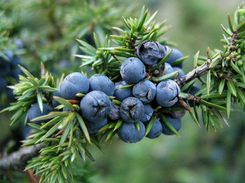Borovicska
The Borovicskâs they are now extinct. Their last representatives merged into the Bolgány ethnic group.[1] Their culture has many traditions that are extremely unique.
Etymology
According to the dictionary of the Slovak language (Slovník slovenského jazyka), the term "borovička" (pronounced: borovicska) comes from the word "juniper berry" (borievka). The name of the people can probably be derived from here. This plant plays a very important role in Borovicska culture. According to folk legends, the Slavic peoples named the Borovickás who migrated to Bakony this way, but today they also identify themselves with this name. A spirit drink also bears the name of their people, which is considered a national drink.
Distribution place

The Borovicskas consider the Bakony region to be their own national territory.
Culture

The Borovics claim many elements of modern Christmas as their own. According to the people's interpretation, today's Christian Christmas used to be completely different and most of the elements were taken from their holiday called deňborievky. Today's Christmas tree decoration, for example, is very similar to their tradition of decorating juniper trees with berries and other forest objects. The wreath setting is their custom, when three candles are placed on wreaths made of moss and wood and one is lit every month until December 26.
national symbols
The national plants of the borovicskas are juniper and mistletoe. They don't have a national animal.
Famous Borovicskas.
According to folklore, Borovicska is a fairy-tale figure whose equivalent is Santa Claus. According to legend, this was the name of the first leader of Borovická
National anthem
The national anthem is the song Ó bóróka, which is similar to the Christmas song O Tannenbaum, although according to the people of Borovická, it belongs to their own folk music.
Ó boróka, Ó boróka oly kedves minden ágad!
Ó boróka, Ó boróka oly kedves minden ágad!
Te zöld vagy még ha nyár éget, és zöld ha téli hó fed el.
Ó boróka, Ó boróka oly kedves minden ágad!
Nagy fáink boldog ünnepén hány csodás álmot láttam én!!
Ó boróka, Ó boróka oly kedves minden ágad!
References
- ↑ The war of újborókaföld.